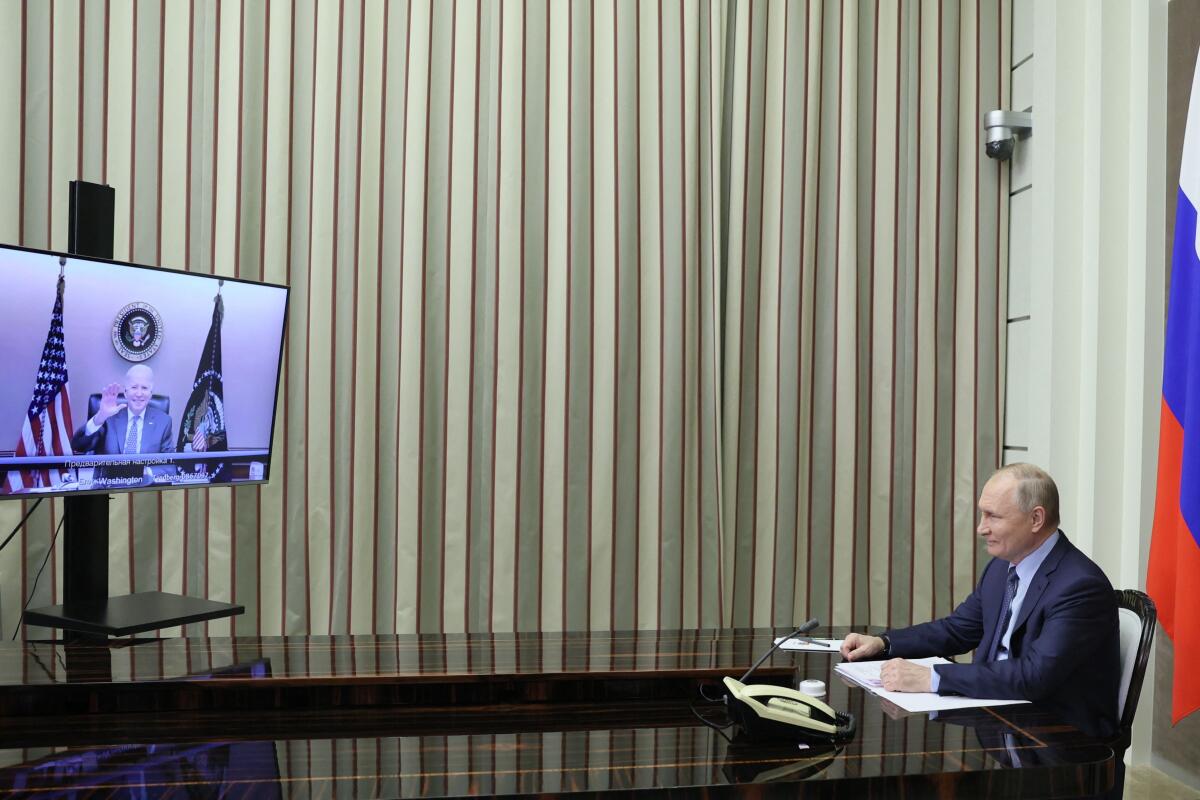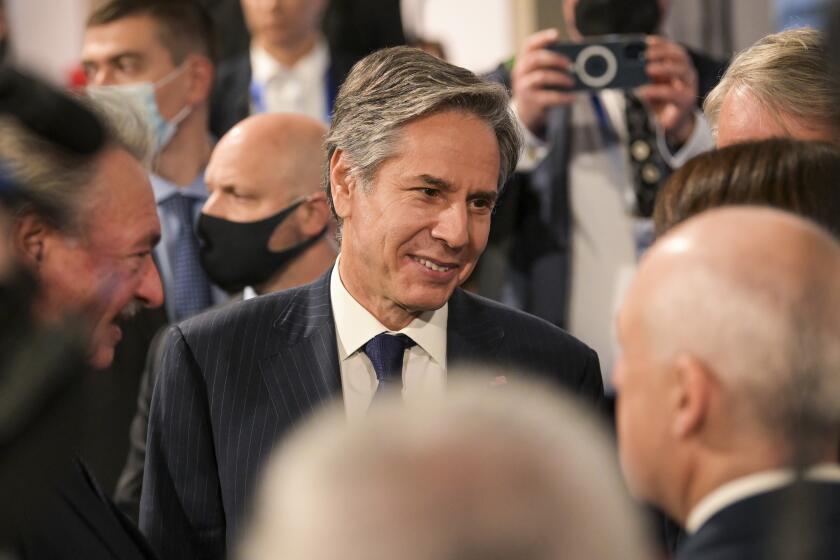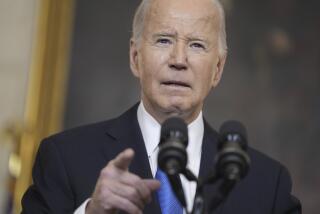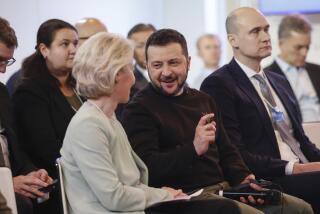Biden urges Putin to seek diplomacy, not war, with Ukraine

President Biden warned Russian counterpart Vladimir Putin during a videoconference Tuesday that invading Ukraine would result in stiff economic sanctions from the U.S. and several European allies.
The virtual meeting, the second time the two leaders have held direct talks since their June summit in Geneva, arose after Putin mobilized about 100,000 Russian forces on the country’s border with Ukraine, sparking new fears about an invasion.
“President Biden voiced the deep concerns of the United States and our European Allies about Russia’s escalation of forces surrounding Ukraine and made clear that the U.S. and our Allies would respond with strong economic and other measures in the event of military escalation,” according to a readout of the call released by the White House after the conference.
During their two-hour meeting, Biden reiterated his support for Ukraine’s sovereignty and called for de-escalation and a return to diplomacy. “The two presidents tasked their teams to follow up, and the U.S. will do so in close coordination with allies and partners,” the statement said.
The two world leaders also discussed U.S. and Russian long-term work on arms control, ransomware and joint efforts on regional issues such as Iran.
Putin has sought assurances that NATO won’t make Ukraine a member of the long-standing alliance, which has 30 member countries, including the United States. Membership would essentially guarantee the former Soviet republic’s military defense.
“President Biden was direct and straightforward with President Putin, as he always is,” said Jake Sullivan, Biden’s national security advisor, after the meeting. “There was no finger-wagging, but the president was crystal clear about where the administration stands.”
He added: “We still do not believe that President Putin has made a decision” about whether to launch an invasion. “We will see in the days ahead through actions, not through words, what course of action Russia chooses to take.”
The Kremlin’s official readout of the meeting blamed Ukraine for the buildup of Russian forces and offered a defensive response to Biden, whom it characterized as having emphasized “the allegedly ‘threatening’ nature of the movements of Russian troops,” and his threat of sanctions.
Putin, the Kremlin said, “stressed that the responsibility should not be shifted onto the shoulders of Russia, since it is NATO that is making dangerous attempts to conquer Ukrainian territory and is building up its military potential at our borders.” Moscow, the readout continued, “is seriously interested in obtaining reliable, legally fixed guarantees excluding the expansion of NATO in the eastern direction and the deployment of offensive strike weapons systems in the states adjacent to Russia.”
Although Biden has publicly rejected any of Putin’s “red lines” and expressed support for Ukraine’s territorial sovereignty, he has shown little interest in fully backing its potential membership in the North Atlantic Treaty Organization. The president, even as he has sought to strengthen democratic alliances, has appeared wary of the U.S. taking on additional global defense responsibilities as he focuses on shoring up the American economy and reorienting alliances around the containment of China.
But he is hoping to dissuade Putin from escalating the simmering military conflict along the Russia-Ukraine border.
“This is one of the last, best chances to affect Kremlin thinking,” said Steven Pifer, a former U.S. ambassador to Ukraine who is now the William Perry fellow at Stanford University. Putin’s response in the coming weeks and months, he continued, will make it clear whether Biden made any inroads.
“The big questions to be answered are: Do we see the Russian military deployments changing?” Pifer said. “And how does the Kremlin portray the call, and do the Russians tone down the really over-the-top rhetoric they’ve been issuing about Ukraine in recent days?”
Before the discussion with Putin, Biden conferred with top European allies Monday evening about the far-reaching economic sanctions any invasion would trigger.
So far, tensions between Washington and Moscow over Ukraine have been restricted to a war of words, but could it flare into something more dangerous?
And Biden spoke again with the top four European leaders on another call Tuesday afternoon to update allies on the nature of his talks with Putin, the White House said. He is scheduled to speak with Ukrainian President Volodymyr Zelensky on Wednesday.
Ukraine won independence after the fall of the Soviet Union in 1991. It has since sought to strengthen ties with Europe. After the ouster of Russia-friendly Ukrainian President Viktor Yanukovich, Putin seized the Black Sea peninsula of Crimea in 2014, and tensions have remained high.
Sullivan suggested the economic sanctions could be more far reaching than those imposed after the annexation of Crimea, although he declined to go into specifics publicly.
“Things we did not do in 2014 we are prepared to do now,” he said.
He also challenged the idea that Russia’s leverage had increased from the near completion of the Nord Stream 2 natural gas pipeline between Russia and Germany, a project the Biden administration opposed but so far has not attempted to halt. Noting that “gas is not currently flowing” through the pipeline, Sullivan even hinted that the U.S. could still sanction the project, which allows Russian gas to flow directly to Europe, if Putin were to invade Ukraine.
“If Putin wants to see gas flowing through that pipeline, he may not want to take the risk of invading Ukraine,” Sullivan said.
Several Republicans, including Sen. Ted Cruz of Texas, have called for sanctions against the pipeline.
President Trump softened America’s posture toward Putin, who U.S. intelligence officials say conducted a misinformation campaign to help Trump in the 2016 election. In 2019, Trump pressured Zelensky to announce a corruption investigation into Hunter Biden’s business dealings in Kyiv, in an attempt to smear his father, the eventual Democratic nominee. That effort led to Trump’s first impeachment by the House in 2019.
Since taking office, Biden has sought to return U.S. foreign policy to its more traditional position of skepticism toward Russia and support for the fledgling democracies that emerged after the Soviet Union was dissolved.
He welcomed Zelensky at the White House in September and has reaffirmed the importance of NATO while still hedging on the question of Ukraine’s potential membership.
More to Read
Get the L.A. Times Politics newsletter
Deeply reported insights into legislation, politics and policy from Sacramento, Washington and beyond. In your inbox three times per week.
You may occasionally receive promotional content from the Los Angeles Times.








